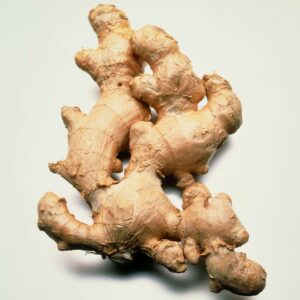Ginger is a widely used plant root and has been touted for its overall health benefits including management of nausea and vomiting. Ginger has also been researched as an anti-inflammatory agent. Multiple chronic diseases such as arthritis and obesity are marked with significant inflammation of the joints and other organs.
Clinical Evidence and Warning
In 2020, a systematic review of 13 clinical studies on ginger supplementation was conducted. The patients in these studies had type 2 diabetes and/or obesity, fatty liver disease, osteoarthritis of the knee, and those undergoing peritoneal dialysis*. Patients consumed between 1 and 3 grams of ginger for 42 to 90 days.
A review of all the results found that ginger supplementation in general can lower levels of proteins involved in inflammation in the blood (such as C-reactive protein (CRP), interleukin-6 (IL-6), and tumour necrosis factor alpha (TNF-α)). Some of the results were more profound in women, and longer periods of ginger consumption (beyond 80 days) improved outcomes. Results of the studies also showed the ginger is safe and tolerated at these consumption levels.
Warning
Ginger is not recommended for those with allergies to ginger or ginger-containing products. Ginger may also interact with certain medications such as blood thinners (aspirin, warfarin (Coumadin), clopidogrel (Plavix)). Ginger has also been shown to lower blood glucose and blood pressure levels, so care should be taken when administering medications for diabetes and high blood pressure.
References
Askari G, Aghajani M, Salehi M, Najafgholizadeh A, Keshavarzpour Z, Fadel A, Venkatakrishnan K, Salehi-sahlabadi A, Hadi A, Pourmasoumi M. The effects of ginger supplementation on biomarkers of inflammation and oxidative stress in adults: A systematic review and meta-analysis of randomized controlled trials. Journal of Herbal Medicine. 2020 Aug 1;22:100364.
Vaes LP, Chyka PA. Interactions of warfarin with garlic, ginger, ginkgo, or ginseng: nature of the evidence. Ann Pharmacother. 2000;34(12):1478-1482.






